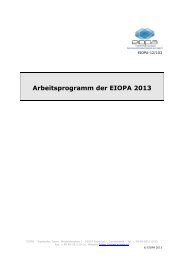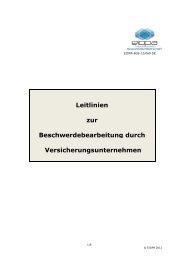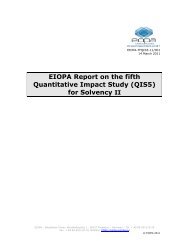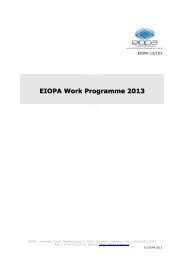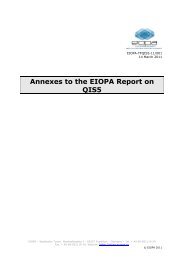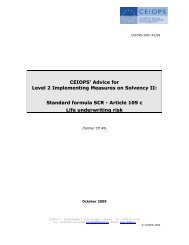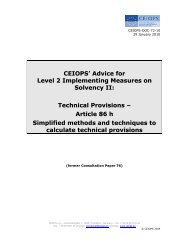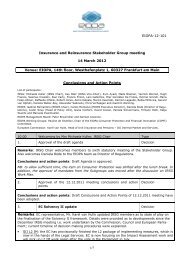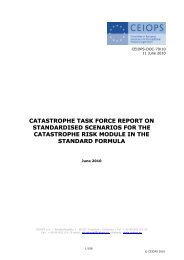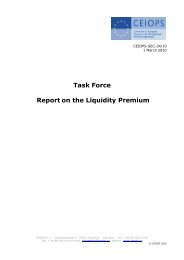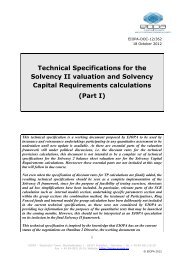Answers to the European Commission on the ... - Eiopa - Europa
Answers to the European Commission on the ... - Eiopa - Europa
Answers to the European Commission on the ... - Eiopa - Europa
Create successful ePaper yourself
Turn your PDF publications into a flip-book with our unique Google optimized e-Paper software.
appoint an additi<strong>on</strong>al pers<strong>on</strong> <str<strong>on</strong>g>to</str<strong>on</strong>g> <str<strong>on</strong>g>the</str<strong>on</strong>g> functi<strong>on</strong> or <str<strong>on</strong>g>to</str<strong>on</strong>g> change a pers<strong>on</strong><br />
exercising <str<strong>on</strong>g>the</str<strong>on</strong>g> functi<strong>on</strong>.<br />
16.21 Fur<str<strong>on</strong>g>the</str<strong>on</strong>g>rmore, <str<strong>on</strong>g>the</str<strong>on</strong>g> supervisory assessment should not end after a pers<strong>on</strong><br />
has been approved. Supervisors need <str<strong>on</strong>g>to</str<strong>on</strong>g> remain alert <str<strong>on</strong>g>to</str<strong>on</strong>g> any<br />
informati<strong>on</strong> that could alter <str<strong>on</strong>g>the</str<strong>on</strong>g>ir assessment. A single event may result<br />
in a pers<strong>on</strong> no l<strong>on</strong>ger being c<strong>on</strong>sidered fit and proper. Supervisory<br />
authorities should also c<strong>on</strong>sider <str<strong>on</strong>g>the</str<strong>on</strong>g> overall picture; individual<br />
'instances' which would not be sufficient <str<strong>on</strong>g>to</str<strong>on</strong>g> dispute a pers<strong>on</strong>’s suitability<br />
or reliability, however, <str<strong>on</strong>g>the</str<strong>on</strong>g> occurrence of a number of <str<strong>on</strong>g>the</str<strong>on</strong>g>m may<br />
<str<strong>on</strong>g>to</str<strong>on</strong>g>ge<str<strong>on</strong>g>the</str<strong>on</strong>g>r indicate unsuitability. CEIOPS recognises that in some Member<br />
States a disqualificati<strong>on</strong> can arise <strong>on</strong>ly from formal and prescribed<br />
failures or events, as prescribed in legislati<strong>on</strong>.<br />
16.22 The degree of incompatibility between <str<strong>on</strong>g>the</str<strong>on</strong>g> positi<strong>on</strong> of a manager in an<br />
insurance undertaking and o<str<strong>on</strong>g>the</str<strong>on</strong>g>r activities is an important criteri<strong>on</strong> for<br />
judging whe<str<strong>on</strong>g>the</str<strong>on</strong>g>r a specific pers<strong>on</strong> can be appointed as a manager. The<br />
decisive fac<str<strong>on</strong>g>to</str<strong>on</strong>g>r is whe<str<strong>on</strong>g>the</str<strong>on</strong>g>r <str<strong>on</strong>g>the</str<strong>on</strong>g> o<str<strong>on</strong>g>the</str<strong>on</strong>g>r activity might c<strong>on</strong>flict with <str<strong>on</strong>g>the</str<strong>on</strong>g><br />
interests of <str<strong>on</strong>g>the</str<strong>on</strong>g> insurance undertaking and/or policyholders. An activity<br />
as an insurance broker is a prime example.<br />
16.23 Modern informati<strong>on</strong> technology enables people <str<strong>on</strong>g>to</str<strong>on</strong>g> c<strong>on</strong>duct a large<br />
proporti<strong>on</strong> of <str<strong>on</strong>g>the</str<strong>on</strong>g>ir business duties from virtually anywhere without<br />
actually having <str<strong>on</strong>g>to</str<strong>on</strong>g> enter <str<strong>on</strong>g>the</str<strong>on</strong>g>ir offices. Never<str<strong>on</strong>g>the</str<strong>on</strong>g>less, if a manager’s place<br />
of residence is a c<strong>on</strong>siderable distance from his office, steps have <str<strong>on</strong>g>to</str<strong>on</strong>g> be<br />
taken <str<strong>on</strong>g>to</str<strong>on</strong>g> ensure sound and prudent management at <str<strong>on</strong>g>the</str<strong>on</strong>g> insurance<br />
undertaking.<br />
16.24 In order <str<strong>on</strong>g>to</str<strong>on</strong>g> avoid <str<strong>on</strong>g>the</str<strong>on</strong>g> problem of a dominant CEO or Chairman who<br />
operates in isolati<strong>on</strong>, CEIOPS proposes that <str<strong>on</strong>g>the</str<strong>on</strong>g>re are a number of<br />
different ways of reducing this risk. The utilisati<strong>on</strong> of <str<strong>on</strong>g>the</str<strong>on</strong>g> ‘four eye<br />
principle’ that is <str<strong>on</strong>g>to</str<strong>on</strong>g> say, that at least a minimum of two pers<strong>on</strong>s are<br />
actually managing <str<strong>on</strong>g>the</str<strong>on</strong>g> company, is <strong>on</strong>e way in addressing this problem.<br />
O<str<strong>on</strong>g>the</str<strong>on</strong>g>r alternatives are that undertakings must have str<strong>on</strong>g internal<br />
c<strong>on</strong>trols, a governance structure which supports a collegiate decisi<strong>on</strong><br />
making process, active board participati<strong>on</strong> and independent and<br />
challenging audit arrangements provide a more immediate and<br />
effective check <strong>on</strong> <str<strong>on</strong>g>the</str<strong>on</strong>g> dominance of an individual. Article 6.1 of <str<strong>on</strong>g>the</str<strong>on</strong>g><br />
Directive 2000/12/EC 125 relating <str<strong>on</strong>g>to</str<strong>on</strong>g> <str<strong>on</strong>g>the</str<strong>on</strong>g> taking up and pursuit of <str<strong>on</strong>g>the</str<strong>on</strong>g><br />
business of credit instituti<strong>on</strong>s, for example, also dictates that<br />
authorisati<strong>on</strong> will <strong>on</strong>ly be granted if two executive direc<str<strong>on</strong>g>to</str<strong>on</strong>g>rs are<br />
appointed. The discussi<strong>on</strong> in CEIOPS underlined <str<strong>on</strong>g>the</str<strong>on</strong>g> importance of good<br />
management in guarding against <str<strong>on</strong>g>the</str<strong>on</strong>g> collapse of companies. This<br />
importance would not be adequately taken in<str<strong>on</strong>g>to</str<strong>on</strong>g> account if <str<strong>on</strong>g>the</str<strong>on</strong>g><br />
management of an undertaking were entrusted <str<strong>on</strong>g>to</str<strong>on</strong>g> a single pers<strong>on</strong> who<br />
would thus not be obliged <str<strong>on</strong>g>to</str<strong>on</strong>g> coordinate planned decisi<strong>on</strong>s or <str<strong>on</strong>g>to</str<strong>on</strong>g> take<br />
<str<strong>on</strong>g>the</str<strong>on</strong>g> opini<strong>on</strong> of ano<str<strong>on</strong>g>the</str<strong>on</strong>g>r pers<strong>on</strong> in<str<strong>on</strong>g>to</str<strong>on</strong>g> account. In <str<strong>on</strong>g>the</str<strong>on</strong>g> past, it has not been<br />
possible <str<strong>on</strong>g>to</str<strong>on</strong>g> agree <strong>on</strong> a comm<strong>on</strong> minimum number. There may be some<br />
particular situati<strong>on</strong>s where excepti<strong>on</strong>s could possibly be admitted, e.g.<br />
in <str<strong>on</strong>g>the</str<strong>on</strong>g> case of small, captive, or specialised insurers.<br />
125 As amended by Directive 2000/28/EC<br />
187



